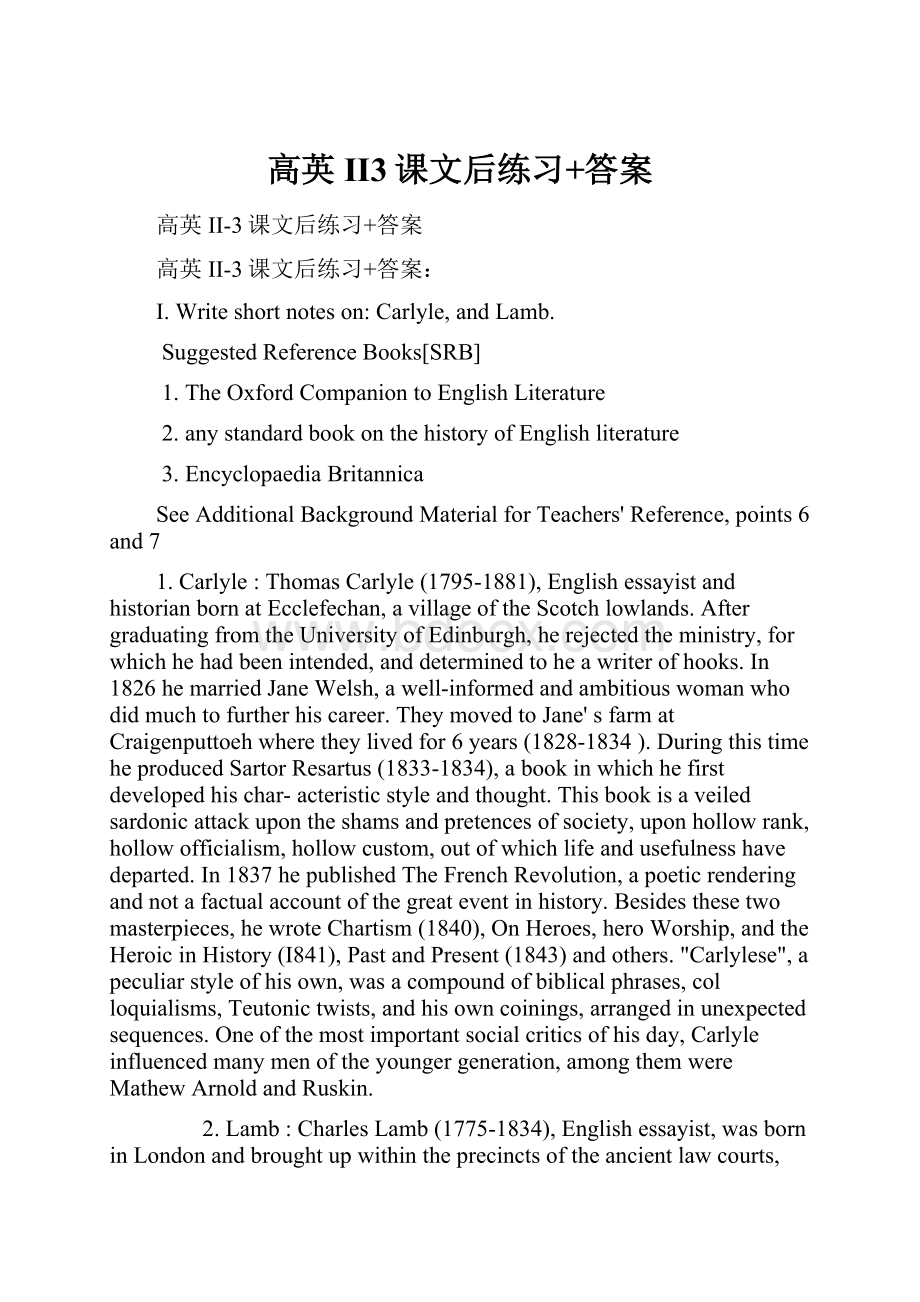高英II3课文后练习+答案.docx
《高英II3课文后练习+答案.docx》由会员分享,可在线阅读,更多相关《高英II3课文后练习+答案.docx(13页珍藏版)》请在冰豆网上搜索。

高英II3课文后练习+答案
高英II-3课文后练习+答案
高英II-3课文后练习+答案:
I.Writeshortnoteson:
Carlyle,andLamb.
SuggestedReferenceBooks[SRB]
1.TheOxfordCompaniontoEnglishLiterature
2.anystandardbookonthehistoryofEnglishliterature
3.EncyclopaediaBritannica
SeeAdditionalBackgroundMaterialforTeachers'Reference,points6and7
1.Carlyle:
ThomasCarlyle(1795-1881),EnglishessayistandhistorianbornatEcclefechan,avillageoftheScotchlowlands.AftergraduatingfromtheUniversityofEdinburgh,herejectedtheministry,forwhichhehadbeenintended,anddeterminedtoheawriterofhooks.In1826hemarriedJaneWelsh,awell-informedandambitiouswomanwhodidmuchtofurtherhiscareer.TheymovedtoJane'sfarmatCraigenputtoehwheretheylivedfor6years(1828-1834).DuringthistimeheproducedSartorResartus(1833-1834),abookinwhichhefirstdevelopedhischar-acteristicstyleandthought.Thisbookisaveiledsardonicattackupontheshamsandpretencesofsociety,uponhollowrank,hollowofficialism,hollowcustom,outofwhichlifeandusefulnesshavedeparted.In1837hepublishedTheFrenchRevolution,apoeticrenderingandnotafactualaccountofthegreateventinhistory.Besidesthesetwomasterpieces,hewroteChartism(1840),OnHeroes,heroWorship,andtheHeroicinHistory(I841),PastandPresent(1843)andothers."Carlylese",apeculiarstyleofhisown,wasacompoundofbiblicalphrases,colloquialisms,Teutonictwists,andhisowncoinings,arrangedinunexpectedsequences.Oneofthemostimportantsocialcriticsofhisday,Carlyleinfluencedmanymenoftheyoungergeneration,amongthemwereMathewArnoldandRuskin.
2.Lamb:
CharlesLamb(1775-1834),Englishessayist,wasborninLondonandbroughtupwithintheprecinctsoftheancientlawcourts,hisfatherbeingaservanttoanadvocateoftheinnerTemple.HewenttoschoolatChrist'sHospital,wherehehadforaclassmateColeridge,hislife-longfriend.Atseventeen,hebecameaclerkintheIndiaHouseandhereheworkedfor33yearsuntilhewasre-tiredonapension.HisdevotiontohissisterMary,uponwhomrestedanhereditarytaintofinsanity,hasdoneal-mostasmuchasthesweetnessandgentlehumorofhiswritingstoendearhisname.Theycollaboratedonseveralbooksforchildren,publishingin1867theirfamousTalesfromShakespeare.Hisdramaticessays,SpecimensofEnglishDramaticPoets(1808),establishedhisreputationasacriticanddidmuchinrevivingthepopularityofEliza-bethendrama.TheEssaysofElla,publishedatintervalsinLondonMagazine,weregatheredtogetherandrepublishedintwoseries,thefirstin1823,thesecondtenyearslater.TheyestablishedLambinthetitlewhichhestillholds,thatofthemostdelightfulofEnglishessayists.
II.Questionsoncontent:
1.What,accordingtothewriter,makesgoodconversation?
Whatspoilsit?
Agoodconversationdoesnotreallystartfromanywhere,andnoonehasanyideawhereitwillgo.Agoodconversationisnotformakingapoint.Argumentmayoftenbeapartofit,butthepurposeoftheargumentisnottoconvince.Whenpeoplebecomeseriousandtalkasiftheyhavesomethingveryimportanttosay,whentheyarguetoconvinceortowintheirpoint,theconversationisspoilt.
2.Whydoesthewriterlike"barconversation"somuch?
Thewriterlikesbarconversationverymuchbecausehehasspentalotoftimeinpubsandisusedtothiskindofconversation.Barfriendsarecompanions,notintimates密友;挚友.Theyarefriendsbutnotintimateenoughtobecuriousabouteachother'sprivatelifeandthoughts.
3.Doesagoodconversationneedafocalsubjecttotalkabout?
No.Conversationdoesnotneedafocus.Butwhenafocal焦点的subjectappearsinthenaturalflowofconversation,theconversationbecomesvivid,livelyandmoreinteresting.
4.WhydidthepeopletalkaboutAustralia?
WhydidtheconversationturntoNormanEngland?
ThepeopletalkedaboutAustraliabecausethespeakerwhointroducedthesubjectmentionedincidentallythatitwasanAustralianwhohadgivenhersuchadefinitionof"theKing'sEnglish."Whenthepeopletalkedabouttheresistanceinthelowerclassestoanyattemptbyanupperclasstolaydownrulesfor"Englishasitshouldbespoken",theconversationmovedtoNormanEnglandbecauseatthattimealanguagebarrierexistedbetweentheSaxonpeasantsandtheNormanconquerors.
5.Howdoestheuseofwordsshowclassdistinction?
TheSaxonpeasantsandtheirNormanconquerorsuseddifferentwordsforthesamething.Forexamplesseeparagraph9.
6.Canyouguessthewriter'sviewsonbilingualeducation?
(para11)
Thewriterseemstobeinfavorofbilingualeducation.Heisagainstanyformofculturalbarrierortheculturalhumiliationofanysectionorgroupofpeople.
7.Whywastheterm"Queen'sEnglish"usedin1593and"theKing'sEnglish'in16027
Theterm"theQueen'sEnglish"wasusedin1953byNashbecauseatthattimethereigningmonarchwasaqueen,ElizabethI.Theterm"theKing'sEnglish"isthemorecommonformbecausetherulingmonarchisgenerallyaking.Thosewhoarenotveryparticularmayusetheterm"theKing'sEnglish",evenwhentherulingmonarchisaqueen.In1602,Dekkerusedtheterm"theKing'sEnglish",althoughthereigningmonarchwasstillQueenElizabeth.
8.Whenwas"theKing'sEnglish"regardedasaformofracialdiscriminationinEngland?
“TheKing’sEnglish”wasregardedasaform0fracialdiscriminationduringtheNormanruleinEnglandabout1154—1399.
9.Whatistheattitudeofthewritertowards"theKing'sEnglish''?
Thewriterthinks“theKing’sEnglish”isaclassrepresentationofreality.1tisworthtryingtospeak“theKing’sEnglish”,butitshouldnotbe1aiddownasanedict,andmadeimmunetochangefrombelow.TheKing’sEnglishisamodelarichandinstructiveone-butitoughtnottobeanultimatum最后通碟.
10.Whatdoesthewritermeanwhenhesays,"theKing'sEnglish,liketheAnglo-FrenchoftheNormans,isaclassrepresentationofreality"?
(para16)
DuringtheNormanperiod,therulingclassspokeAnglo-FrenchwhilethepeasantsspoketheirnativeSaxonlanguage.Languagebearsthestampoftheclassthatusesit.TheKing’sEnglishtodayreferstothelanguageusedbytheupper,educatedclassinEngland.
III.Questionsonappreciation:
1.Inwhatwayis"pubtalk"connectedwith"theKing'sEnglish''?
Isthetitleofthepiecewellchosen?
Thetitleofthispieceisnotwellchosen.ItmisleadsthereadersintothinkingthatthewriterisgoingtodemonstratesomeintrinsicorlinguisticrelationshipbetweenpubtalkandtheKing’sEnglish.Whereasthewriter.inreality,isjustdiscoursingonwhatmakesgoodconversation.TheKing’sEnglishisconnectedwith“pubtalk”whenthewriterdescribesthecharmingconversationhehadwithsomepeopleoneeveninginapubonthetopic“theKing’sEnglish”toillustratehispointthatbarconversationinapubhasacharmofitsown.
2.Pointouttheliteraryandhistoricalallusionsusedinthispieceandcommentontheiruse.
1nthisessaythewriteralludedtomanyhistoricalandliteraryeventsuchastheNormanconquest,thesaloonsof18thcenturyParis,andthewordsofmanyamanofletters.Forashortexpositoryessaylikethis,theallusionsusedaremorethanexpectedanddesirable.
3.Whatisthefunctionofpara5?
Isthechangefrom"pubtalk"to"theKing'sEnglish"tooabrupt?
Paragraph5isatransitionparagraphbymeansofwhichthewriterpassesfromageneraldiscourseongoodconversationtoaparticularinstanceofit.Butonefeelsthechangefrom“pubtalk”to“theKing'sEnglish”abittooabrupt.
4.Dothesimpleidiomaticexpressionslike"tobeontherocks,outofbedonthewrongside,etc.,"gowellwiththecopiousliteraryandhistoricalallusionsthewriteruses?
Giveyourreasons.
Thesimpleidiomaticexpressionslike"tobeontherocks,outofbedonthewrongside,etc.”maybesaidtogowellwiththecopiousliteraryandhistoricalallusionsthewriterusedforaninformalconversationalstyletoSuitthethemeofthisessayinwhichthewritertriestodefendinformalusesoflanguage.
5.Doesthewriterrevealhispoliticalinclinationinthispieceofwriting?
How?
Thewriter’sattitudetowards“theKing’sEnglish”showsthatheisadefenderofdemocracy.
IV.Paraphrase:
1.Anditisanacuvityonlyofhumans.(para1)
Andconversationisanactivitywhichisfoundonlyamonghumanbeings.(Animalsandbirdsarenotcapableofconversation.)
2.Conversationisnotformakingapoint.(para2)
Conversationisnotforpersuadingotherstoacceptourideaorpointofview.
3.Infact,thebestconversationalistsarethosewhoarepreparedtolose.(para2)
Infactapersonwhoreallyenjoysandisskilledatconversationwillnotarguetowinorforceotherstoaccepthispointofview.
4.Barfriendsarenotdeeplyinvolvedineachother'slives.(para3)
Peoplewhomeeteachotherforadrinkinthebarofapubarenotintimatefriendsfortheyarenotdeeplyabsorbedorengrossedineachother’slives.
5.itcouldstillgoignorantlyon(para6)
Theconversationcouldgoonwithoutanybodyknowingwhowasrightorwrong.
6.Therearecattleinthefields,butwesitdowntobeef(boeuf).(para9)
Theseanimalsarecalledcattlewhentheyarealiveandfeedinginthefields;butwhenwesitdownatthetabletoeat,wecalltheirmeatbeef.
7.ThenewrulingclasshadbuiltaculturalbarrieragainsthimbybuildingtheirFrenchagainsthisownlanguage.(para11)
ThenewrulingclassbyusingFrenchinsteadofEnglishmadeitdifficultfortheEnglishtoacceptorabsorbthecultureofthe、rulers.
8.Englishhadcomeroyallyintoitsown.(para13)
TheEnglish